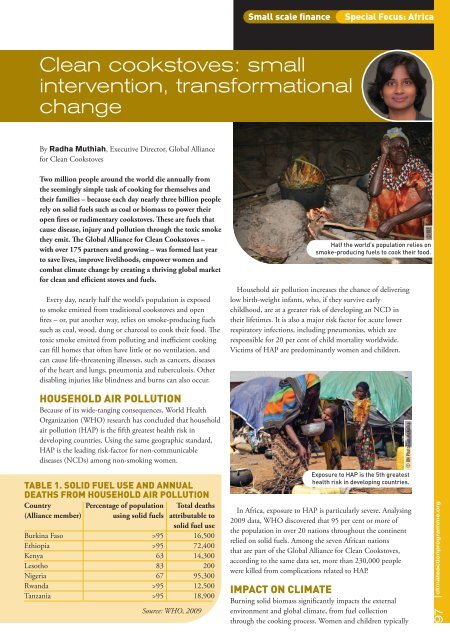Climate Action 2011-2012
Create successful ePaper yourself
Turn your PDF publications into a flip-book with our unique Google optimized e-Paper software.
small scale finance<br />
special focus: africa<br />
Clean cookstoves: small<br />
intervention, transformational<br />
change<br />
By Radha Muthiah, Executive Director, Global Alliance<br />
for Clean Cookstoves<br />
Two million people around the world die annually from<br />
the seemingly simple task of cooking for themselves and<br />
their families – because each day nearly three billion people<br />
rely on solid fuels such as coal or biomass to power their<br />
open fires or rudimentary cookstoves. These are fuels that<br />
cause disease, injury and pollution through the toxic smoke<br />
they emit. The Global Alliance for Clean Cookstoves –<br />
with over 175 partners and growing – was formed last year<br />
to save lives, improve livelihoods, empower women and<br />
combat climate change by creating a thriving global market<br />
for clean and efficient stoves and fuels.<br />
Every day, nearly half the world’s population is exposed<br />
to smoke emitted from traditional cookstoves and open<br />
fires – or, put another way, relies on smoke-producing fuels<br />
such as coal, wood, dung or charcoal to cook their food. The<br />
toxic smoke emitted from polluting and inefficient cooking<br />
can fill homes that often have little or no ventilation, and<br />
can cause life-threatening illnesses, such as cancers, diseases<br />
of the heart and lungs, pneumonia and tuberculosis. Other<br />
disabling injuries like blindness and burns can also occur.<br />
Household air pollution increases the chance of delivering<br />
low birth-weight infants, who, if they survive early<br />
childhood, are at a greater risk of developing an NCD in<br />
their lifetimes. It is also a major risk factor for acute lower<br />
respiratory infections, including pneumonias, which are<br />
responsible for 20 per cent of child mortality worldwide.<br />
Victims of HAP are predominantly women and children.<br />
© GIZ<br />
Half the world’s population relies on<br />
smoke-producing fuels to cook their food.<br />
HouseHold air pollution<br />
Because of its wide-ranging consequences, World Health<br />
Organization (WHO) research has concluded that household<br />
air pollution (HAP) is the fifth greatest health risk in<br />
developing countries. Using the same geographic standard,<br />
HAP is the leading risk-factor for non-communicable<br />
diseases (NCDs) among non-smoking women.<br />
table 1. solid fuel use and annual<br />
deatHs from HouseHold air pollution<br />
Country Percentage of population Total deaths<br />
(Alliance member) using solid fuels attributable to<br />
solid fuel use<br />
Burkina Faso >95 16,500<br />
Ethiopia >95 72,400<br />
Kenya 63 14,300<br />
Lesotho 83 200<br />
Nigeria 67 95,300<br />
Rwanda >95 12,500<br />
Tanzania >95 18,900<br />
Source: WHO, 2009<br />
In Africa, exposure to HAP is particularly severe. Analysing<br />
2009 data, WHO discovered that 95 per cent or more of<br />
the population in over 20 nations throughout the continent<br />
relied on solid fuels. Among the seven African nations<br />
that are part of the Global Alliance for Clean Cookstoves,<br />
according to the same data set, more than 230,000 people<br />
were killed from complications related to HAP.<br />
impact on climate<br />
Burning solid biomass significantly impacts the external<br />
environment and global climate, from fuel collection<br />
through the cooking process. Women and children typically<br />
© UN Photo/Tim McKulka<br />
Exposure to HAP is the 5th greatest<br />
health risk in developing countries.<br />
97 climateactionprogramme.org












